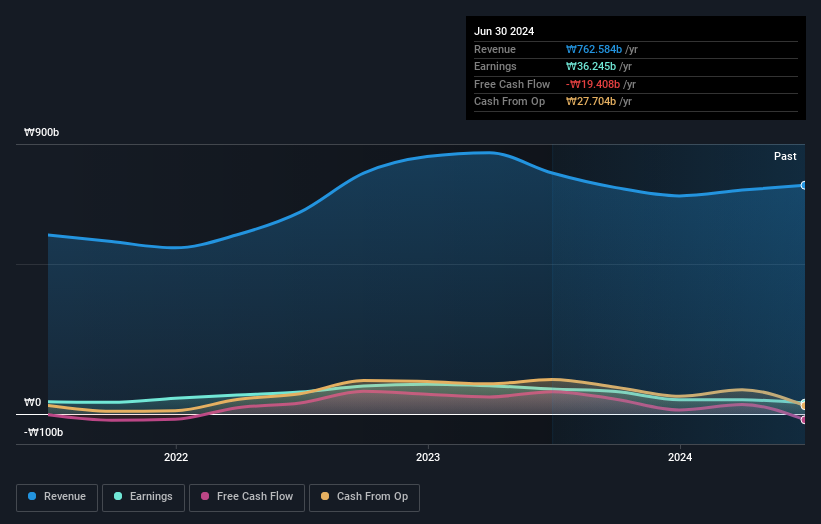- South Korea
- /
- Semiconductors
- /
- KOSE:A029460
KC Co., Ltd.'s (KRX:029460) largest shareholder, Co-Chief Executive Officer Sang-Geul Go sees holdings value fall by 11% following recent drop

Key Insights
- KC's significant insider ownership suggests inherent interests in company's expansion
- 50% of the business is held by the top 3 shareholders
- Past performance of a company along with ownership data serve to give a strong idea about prospects for a business
To get a sense of who is truly in control of KC Co., Ltd. (KRX:029460), it is important to understand the ownership structure of the business. And the group that holds the biggest piece of the pie are individual insiders with 46% ownership. That is, the group stands to benefit the most if the stock rises (or lose the most if there is a downturn).
And last week, insiders endured the biggest losses as the stock fell by 11%.
Let's take a closer look to see what the different types of shareholders can tell us about KC.
View our latest analysis for KC

What Does The Institutional Ownership Tell Us About KC?
Institutional investors commonly compare their own returns to the returns of a commonly followed index. So they generally do consider buying larger companies that are included in the relevant benchmark index.
KC already has institutions on the share registry. Indeed, they own a respectable stake in the company. This implies the analysts working for those institutions have looked at the stock and they like it. But just like anyone else, they could be wrong. It is not uncommon to see a big share price drop if two large institutional investors try to sell out of a stock at the same time. So it is worth checking the past earnings trajectory of KC, (below). Of course, keep in mind that there are other factors to consider, too.

KC is not owned by hedge funds. From our data, we infer that the largest shareholder is Sang-Geul Go (who also holds the title of Co-Chief Executive Officer) with 29% of shares outstanding. Its usually considered a good sign when insiders own a significant number of shares in the company, and in this case, we're glad to see a company insider play the role of a key stakeholder. With 16% and 4.6% of the shares outstanding respectively, Suk-Tai Ko and National Pension Service are the second and third largest shareholders. Interestingly, the second-largest shareholder, Suk-Tai Ko is also Co-Chief Executive Officer, again, pointing towards strong insider ownership amongst the company's top shareholders.
To make our study more interesting, we found that the top 3 shareholders have a majority ownership in the company, meaning that they are powerful enough to influence the decisions of the company.
Researching institutional ownership is a good way to gauge and filter a stock's expected performance. The same can be achieved by studying analyst sentiments. As far as we can tell there isn't analyst coverage of the company, so it is probably flying under the radar.
Insider Ownership Of KC
The definition of company insiders can be subjective and does vary between jurisdictions. Our data reflects individual insiders, capturing board members at the very least. Company management run the business, but the CEO will answer to the board, even if he or she is a member of it.
Insider ownership is positive when it signals leadership are thinking like the true owners of the company. However, high insider ownership can also give immense power to a small group within the company. This can be negative in some circumstances.
It seems insiders own a significant proportion of KC Co., Ltd.. Insiders have a ₩95b stake in this ₩207b business. It is great to see insiders so invested in the business. It might be worth checking if those insiders have been buying recently.
General Public Ownership
The general public-- including retail investors -- own 45% stake in the company, and hence can't easily be ignored. While this size of ownership may not be enough to sway a policy decision in their favour, they can still make a collective impact on company policies.
Next Steps:
It's always worth thinking about the different groups who own shares in a company. But to understand KC better, we need to consider many other factors. Take risks for example - KC has 2 warning signs we think you should be aware of.
Of course this may not be the best stock to buy. Therefore, you may wish to see our free collection of interesting prospects boasting favorable financials.
NB: Figures in this article are calculated using data from the last twelve months, which refer to the 12-month period ending on the last date of the month the financial statement is dated. This may not be consistent with full year annual report figures.
Valuation is complex, but we're here to simplify it.
Discover if KC might be undervalued or overvalued with our detailed analysis, featuring fair value estimates, potential risks, dividends, insider trades, and its financial condition.
Access Free AnalysisHave feedback on this article? Concerned about the content? Get in touch with us directly. Alternatively, email editorial-team (at) simplywallst.com.
This article by Simply Wall St is general in nature. We provide commentary based on historical data and analyst forecasts only using an unbiased methodology and our articles are not intended to be financial advice. It does not constitute a recommendation to buy or sell any stock, and does not take account of your objectives, or your financial situation. We aim to bring you long-term focused analysis driven by fundamental data. Note that our analysis may not factor in the latest price-sensitive company announcements or qualitative material. Simply Wall St has no position in any stocks mentioned.
About KOSE:A029460
KC
Manufactures and distributes semiconductor systems, display systems, and electronic materials in South Korea and internationally.
Flawless balance sheet and slightly overvalued.


